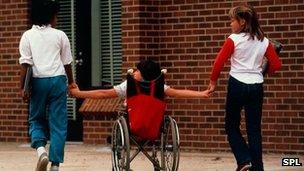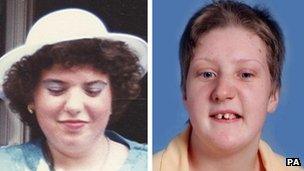Disability hate crime is 'overlooked and under-reported'
- Published

More than 1,700 disabled people were the victim of a hate crime in 2011-12
Police are "too sensitive" about asking victims of crime if they are disabled, an inspection has found.
Disability hate crime is "overlooked" and "under-reported", a joint inspectorate review into police, probation and the Crown Prosecution Service in England and Wales found.
The review recommends a new "common definition" of the crime to ensure it is dealt with effectively and quickly.
Senior police officers said they had "worked hard to improve its handling".
More than 1,700 disability hate crimes were recorded by police in England and Wales in 2011-12.
The joint review of disability hate crime, external was prompted by the case of Fiona Pilkington, who killed herself and her disabled daughter Francecca Hardwick in 2007 after repeated complaints to police about harassment by youths.
The review warned a similar case could be happen again if urgent changes were not made.
Inspectors interviewed staff of varying seniority at six police forces and the associated CPS and probation trust offices based in Cleveland, Cumbria, Derbyshire, Hertfordshire, Greater Manchester and West Midlands.
They also observed seven court hearings and spoke to disabled victims, representatives from witness care units, the witness service, victim support and a number of independent disability advocates.
Disabled people told inspectors that police officers and control-room operators had become "too sensitive about causing offence", and, as a result, they were reluctant to ask victims if they were disabled.
Among the inspectors' other findings were:
Many police forces do not have a system of support in place to help disabled victims - from the crime being reported through to the case being considered at court
A lack of communication and partnership working between the three agencies resulted in confusion and "limitations" in how victims were dealt with
Prosecutors were often not clear in identifying and analysing disabled hate crime offences and sometimes failed to obtain enough evidence from the police
Disability hate crime must have a higher priority with the work of probation trusts, and they should "address the needs of offenders" found guilty of disability hate crime
Steve Ashley, programme director to HM Inspectorate Constabulary (HMIC), said: "There's a lack of willingness by police officers and police staff in control rooms to ask the right of questions to establish whether it's a crime, whether its anti-social behaviour and what effect disability is having on that person in terms of the effect on the crime."
'Let down'
Mr Ashley said there was also confusion over how to define disability hate crime.
"It's not as easy as identifying a religiously-motivated attack or a racially-motivated attack. Police officers don't like to say to people 'Are you disabled?'," he said.
Asked if the Pilkington case could be happen again in light of the review's findings, Mr Ashley said: "Yes, it could."

Fiona Pilkington killed herself and her disabled daughter Francecca after prolonged abuse by youths
Disability charity Mencap said its own research suggested that nine out of 10 people with a learning disability had been a victim of a hate crime.
Emma Harrison, assistant director at the charity, said the review revealed that "victims of disability hate crime continue to be let down at every stage of the criminal justice system".
She said Mencap welcomed the review's recommendation that the police, probation and CPS must work together to "address these serious and continued failings".
Among its recommendations, the review said a "single, clear and uncomplicated" definition of disability hate crime was required to reduce confusion.
It said the three agencies should consider how their front-line staff participate in disability hate crime training.
It also called for police to encourage victims of the crime to come forward to prevent under-reporting remaining a "significant concern".
'Must change'
And the review said it would recommend that the Law Commission, the body that deals with law reform, looks at creating a stand-alone offence for dealing with disability hate crime.
Speaking on behalf of all three agencies, CPS chief inspector Michael Fuller said: "This report finds that in many ways disability hate crime is the hate crime that has been overlooked.
"The criminal justice system must therefore change to provide an improved service for those with disabilities."
Javed Khan, chief executive of the charity Victim Support, said police must ensure they begin to deliver "improved services" to disabled victims of hate crime.
The Association of Chief Police Officers said the police service had "worked hard to improve its handling of disability hate crime" by speaking with disabled people to understand the types of harassment they face and the barriers that prevent them reporting it and then working with the community and other agencies to help remove those barriers.
Meanwhile, a Home Office spokeswoman said: "The Home Office has improved the way police forces collect and record data on hate crimes, including those against disabled people, and we will keep working with disability groups to ensure victims have the confidence to come forward."
- Published25 January 2013
- Published9 March 2012
- Published13 September 2012